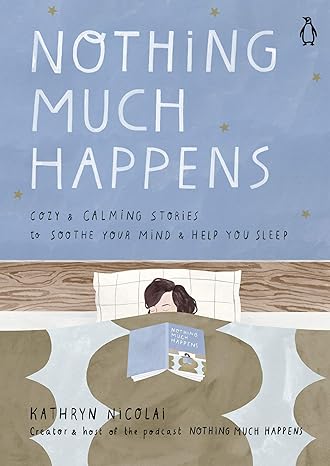
Complete Stories of Dorothy Parker
‘Complete Stories of Dorothy Parker’ is an assortment of work from one of the most quotable of all twentieth-century authors—Dorothy Parker, an American poet, writer, critic, and satirist based in New York; she was best known for her wit and wisecracks. Viewed as brilliant, but known to be an alcoholic and often depressed, Parker's work pushes all buttons at once: humor, anger, love, pity, and everything in between. She wrote with pure, unadulterated passion; her work is timeless and as appropriate to today's society as it was to the time she wrote. Included in this collection are her first published short story, Such a Pretty Little Picture, and her O. Henry Award winner Big Blonde, several other short stories, and, unlike other audio collections, some of her work, including her 1918 New Yorker piece on Tolstoy's play Redemption and a 1927 Vanity Fair review of Emily Post's Etiquette.
BEST DEALS
About the Author
Poet and short story writer Dorothy Parker was born in New Jersey on August 22, 1893. When she was 5, her mother died and her father, a clothes salesman, remarried. Parker had a great antipathy toward her stepmother and refused to speak to her. She attended parochial school and Miss Dana's school in Morristown, New Jersey, for a brief time before dropping out at age 14. A voracious reader, she decided to pursue a career in literature. She began her career by writing verse as well as captions for a fashion magazine. During the years of her greatest fame, Dorothy Parker was known primarily as a writer of light verse, an essential member of the Algonquin Round Table, and a caustic and witty critic of literature and society. She is remembered now as an almost legendary figure of the 1920s and 1930s. Her reviews and staff contributions to three of the most sophisticated magazines of this century, Vanity Fair, the New Yorker, and Esquire, were notable for their put-downs. For all her highbrow wit, however, Dorothy Parker was liberal, even radical, in her political views, and the hard veneer of brittle toughness that she showed to the world was often a shield for frustrated idealism and soft sensibilities. The best of her fiction is marked by a balance of ironic detachment and sympathetic compassion, as in "Big Blonde," which won the O. Henry Award for 1929 and is still her best-remembered and most frequently anthologized story. The best of Dorothy Parker is readily and compactly accessible in The Portable Dorothy Parker. Her own selection of stories and verse for the original edition of that compilation, published in 1944, remains intact in the revised edition, but included also are additional stories, reviews, and articles. Parker died of a heart attack at the age of 73 in 1967. In her will, she bequeathed her estate to the Dr. Martin Luther King, Jr. foundation. Following King's death, her estate was passed on to the NAACP.
Read Sample
1. Arrangement in Black and White
The woman with the pink velvet poppies turned round the assisted gold of her hair traversed the crowded room at an interesting gait combining a skip with a sidle, and clutched the lean arm of her host.
“Now I got you!” she said. “Now you can’t get away!”
“Why, hello,” said her host. “Well. How are you?”
“Oh, I’m finely,” she said. “Just simply finely. Listen. I want you to do me the most terrible favor. Will you? Will you please? Pretty please?”
“What is it?” said her host.
“Listen,” she said. “I want to meet Walter Williams. Honestly, I’m just simply crazy about that man. Oh, when he sings! When he sings those spirituals! Well, I said to Burton, ‘It’s a good thing for you Walter Williams is colored,’ I said, ‘or you’d have lots of reason to be jealous.’ I’d really love to meet him. I’d like to tell him I’ve heard him sing. Will you be an angel and introduce me to him?”
“Why, certainly,” said her host. “I thought you’d met him. The party’s for him. Where is he, anyway?”
“He’s over there by the bookcase,” she said. “Let’s wait till those people get through talking to him. Well, I think you’re simply marvelous, giving this perfectly marvelous party for him, and having him meet all these white people, and all. Isn’t he terribly grateful?”
“I hope not,” said her host.
“I think it’s really terribly nice,” she said. “I do. I don’t see why on earth it isn’t perfectly all right to meet colored people. I haven’t any feeling at all about it—not one single bit. Burton—oh, he’s just the other way. Well, you know, he comes from Virginia, and you know how they are.”
“Did he come tonight?” said her host.
“No, he couldn’t,” she said. “I’m a regular grass widow tonight. I told him when I left, ‘There’s no telling what I’ll do,’ I said. He was just so tired out, he couldn’t move. Isn’t it a shame?”
“Ah,” said her host.
“Wait till I tell him I met Walter Williams!” she said. “He’ll just about die. Oh, we have more arguments about colored people. I talk to him like I don’t know what, I get so excited. ‘Oh, don’t be so silly,’ I say. But I must say for Burton, he’s heaps broader-minded than lots of these Southerners. He’s really awfully fond of colored people. Well, he says himself, he wouldn’t have white servants. And you know, he had this old colored nurse, this regular old nigger mammy, and he just simply loves her. Why, every time he goes home, he goes out in the kitchen to see her. He does, really, to this day. All he says is, he says he hasn’t got a word to say against colored people as long as they keep their place. He’s always doing things for them—giving them clothes and I don’t know what all. The only thing he says, he says he wouldn’t sit down at the table with one for a million dollars. ‘Oh,’ I say to him, ‘you make me sick, talking like that.’ I’m just terrible to him. Aren’t I terrible?”
“Oh, no, no, no,” said her host. “No, no.”
“I am,” she said. “I know I am. Poor Burton! Now, me, I don’t feel that way at all. I haven’t the slightest feeling about colored people. Why, I’m just crazy about some of them. They’re just like children—just as easygoing, and always singing and laughing and everything. Aren’t they the happiest things you ever saw in your life? Honestly, it makes me laugh just to hear them. Oh, I like them. I really do. Well, now, listen, I have this colored laundress, I’ve had her for years, and I’m devoted to her. She’s a real character. And I want to tell you, I think of her as my friend. That’s the way I think of her. As I say to Burton, ‘Well, for Heaven’s sakes, we’re all human beings!’ Aren’t we?”
“Yes,” said her host. “Yes, indeed.”
“Now this Walter Williams,” she said. “I think a man like that’s a real artist. I do. I think he deserves an awful lot of credit. Goodness, I’m so crazy about music or anything, I don’t care what color he is. I honestly think if a person’s an artist, nobody ought to have any feeling at all about meeting them. That’s absolutely what I say to Burton. Don’t you think I’m right?”
“Yes,” said her host. “Oh, yes.”
“That’s the way I feel,” she said. “I just can’t understand people being narrow-minded. Why, I absolutely think it’s a privilege to meet a man like Walter Williams. Yes, I do. I haven’t any feeling at all. Well, my goodness, the good Lord made him, just the same as He did any of us. Didn’t He?”
“Surely,” said her host. “Yes, indeed.”
“That’s what I say,” she said. “Oh, I get so furious when people are narrow-minded about colored people. It’s just all I can do not to say something. Of course, I do admit when you get a bad colored man, they’re simply terrible. But as I say to Burton, there are some bad white people, too, in this world. Aren’t there?”
“I guess there are,” said her host.
“Why, I’d really be glad to have a man like Walter Williams come to my house and sing for us, some time,” she said. “Of course, I couldn’t ask him on account of Burton, but I wouldn’t have any feeling about it at all. Oh, can’t he sing! Isn’t it marvelous, the way they all have music in them? It just seems to be right in them. Come on, let’s us go on over and talk to him. Listen, what shall I do when I’m introduced? Ought I to shake hands? Or what?”
“Why, do whatever you want,” said her host.
“I guess maybe I’d better,” she said. “I wouldn’t for the world have him think I had any feeling. I think I’d better shake hands, just the way I would with anybody else. That’s just exactly what I’ll do.”
They reached the tall young Negro, standing by the bookcase. The host performed introductions; the Negro bowed.
“How do you do?” he said.
The woman with the pink velvet poppies extended her hand at the length of her arm and held it so for all the world to see, until the Negro took it, shook it, and gave it back to her.
“Oh, how do you do, Mr. Williams,” she said. “Well, how do you do. I’ve just been saying, I’ve enjoyed your singing so awfully much. I’ve been to your concerts, and we have you on the phonograph and everything. Oh, I just enjoy it!”
She spoke with great distinctness, moving her lips meticulously, as if in parlance with the deaf.
“I’m so glad,” he said.
“I’m just simply crazy about that ‘Water Boy’ thing you sing,” she said. “Honestly, I can’t get it out of my head. I have my husband nearly crazy, the way I go around humming it all the time. Oh, he looks just as black as the ace of—Well. Tell me, where on earth do you ever get all those songs of yours? How do you ever get hold of them?”
“Why,” he said, “there are so many different——”
“I should think you’d love singing them,” she said. “It must be more fun. All those darling old spirituals—oh, I just love them! Well, what are you doing, now? Are you still keeping up your singing? Why don’t you have another concert, some time?”
“I’m having one the sixteenth of this month,” he said.
“Well, I’ll be there,” she said. “I’ll be there, if I possibly can. You can count on me. Goodness, here comes a whole raft of people to talk to you. You’re just a regular guest of honor! Oh, who’s that girl in white? I’ve seen her some place.”
“That’s Katherine Burke,” said her host.
“Good Heavens,” she said, “is that Katherine Burke? Why, she looks entirely different off the stage. I thought she was much better-looking. I had no idea she was so terribly dark. Why, she looks almost like—Oh, I think she’s a wonderful actress! Don’t you think she’s a wonderful actress, Mr. Williams? Oh, I think she’s marvelous. Don’t you?”
“Yes, I do,” he said.
“Oh, I do, too,” she said. “Just wonderful. Well, goodness, we must give someone else a chance to talk to the guest of honor. Now, don’t forget, Mr. Williams, I’m going to be at that concert if I possibly can. I’ll be there applauding like everything. And if I can’t come, I’m going to tell everybody I know to go, anyway. Don’t you forget!”
“I won’t,” he said. “Thank you so much.”
The host took her arm and piloted her into the next room.
“Oh, my dear,” she said. “I nearly died! Honestly, I give you my word, I nearly passed away. Did you hear that terrible break I made? I was just going to say Katherine Burke looked almost like a nigger. I just caught myself in time. Oh, do you think he noticed?”
“I don’t believe so,” said her host.
“Well, thank goodness,” she said, “because I wouldn’t have embarrassed him for anything. Why, he’s awfully nice. Just as nice as he can be. Nice manners, and everything. You know, so many colored people, you give them an inch, and they walk all over you. But he doesn’t try any of that. Well, he’s got more sense, I suppose. He’s really nice. Don’t you think so?”
“Yes,” said her host.
“I liked him,” she said. “I haven’t any feeling at all because he’s a colored man. I felt just as natural as I would with anybody. Talked to him just as naturally, and everything. But honestly, I could hardly keep a straight face. I kept thinking of Burton. Oh, wait till I tell Burton I called him ‘Mister’!”
2. The Sexes
The young man with the scenic cravat glanced nervously down the sofa at the girl in the fringed dress. She was examining her handkerchief; it might have been the first one of its kind she had seen, so deep was her interest in its material, form, and possibilities. The young man cleared his throat, without necessity or success, producing a small, syncopated noise.
“Want a cigarette?” he said.
“No, thank you,” she said. “Thank you ever so much just the same.”
“Sorry I’ve only got these kind,” he said. “You got any of your own?”
“I really don’t know,” she said. “I probably have, thank you.”
“Because if you haven’t,” he said, “it wouldn’t take me a minute to go up to the corner and get you some.”
“Oh, thank you, but I wouldn’t have you go to all that trouble for anything,” she said. “It’s awfully sweet of you to think of it. Thank you ever so much.”
“Will you for God’s sakes stop thanking me?” he said.
“Really,” she said, “I didn’t know I was saying anything out of the way. I’m awfully sorry if I hurt your feelings. I know what it feels like to get your feelings hurt. I’m sure I didn’t realize it was an insult to say ‘thank you’ to a person. I’m not exactly in the habit of having people swear at me because I say ‘thank you’ to them.”
“I did not swear at you!” he said.
“Oh, you didn’t?” she said. “I see.”
“My God,” he said, “all I said, I simply asked you if I couldn’t go out and get you some cigarettes. Is there anything in that to get up in the air about?”
“Who’s up in the air?” she said. “I’m sure I didn’t know it was a criminal offense to say I wouldn’t dream of giving you all that trouble. I’m afraid I must be awfully stupid, or something.”
“Do you want me to go out and get you some cigarettes; or don’t you?” he said.
“Goodness,” she said, “if you want to go so much, please don’t feel you have to stay here. I wouldn’t have you feel you had to stay for anything.”
“Ah, don’t be that way, will you?” he said.
“Be what way?” she said. “I’m not being any way.”
“What’s the matter?” he said.
“Why, nothing,” she said. “Why?”
“You’ve been funny all evening,” he said. “Hardly said a word to me, ever since I came in.”
“I’m terribly sorry you haven’t been having a good time,” she said. “For goodness’ sakes, don’t feel you have to stay here and be bored. I’m sure there are millions of places you could be having a lot more fun. The only thing, I’m a little bit sorry I didn’t know before, that’s all. When you said you were coming over tonight, I broke a lot of dates to go to the theater and everything. But it doesn’t make a bit of difference. I’d much rather have you go and have a good time. It isn’t very pleasant to sit here and feel you’re boring a person to death.”
“I’m not bored!” he said. “I don’t want to go any place! Ah, honey, won’t you tell me what’s the matter? Ah, please.”
“I haven’t the faintest idea what you’re talking about,” she said. “There isn’t a thing on earth the matter. I don’t know what you mean.”
“Yes, you do,” he said. “There’s something the trouble. Is it anything I’ve done, or anything?”
“Goodness,” she said, “I’m sure it isn’t any of my business, anything you do. I certainly wouldn’t feel I had any right to criticize.”
“Will you stop talking like that?” he said. “Will you, please?”
“Talking like what?” she said.
“You know,” he said. “That’s the way you were talking over the telephone today, too. You were so snotty when I called you up, I was afraid to talk to you.”
“I beg your pardon,” she said. “What did you say I was?
“Well, I’m sorry,” he said. “I didn’t mean to say that. You get me so balled up.”
“You see,” she said, “I’m really not in the habit of hearing language like that. I’ve never had a thing like that said to me in my life.”
“I told you I was sorry, didn’t I?” he said. “Honest, honey, I didn’t mean it. I don’t know how I came to say a thing like that. Will you excuse me? Please?”
“Oh, certainly,” she said. “Goodness, don’t feel you have to apologize to me. It doesn’t make any difference at all. It just seems a little bit funny to have somebody you were in the habit of thinking was a gentleman come to your home and use language like that to you, that’s all. But it doesn’t make the slightest bit of difference.”
“I guess nothing I say makes any difference to you,” he said. “You seem to be sore at me.”
“I’m sore at you?” she said. “I can’t understand what put that idea in your head. Why should I be sore at you?”
“That’s what I’m asking you,” he said. “Won’t you tell me what I’ve done? Have I done something to hurt your feelings, honey? The way you were, over the phone, you had me worried all day. I couldn’t do a lick of work.”
“I certainly wouldn’t like to feel,” she said, “that I was interfering with your work. I know there are lots of girls that don’t think anything of doing things like that, but I think it’s terrible. It certainly isn’t very nice to sit here and have someone tell you interfere with his business.”
“I didn’t say that!” he said. “I didn’t say it!”
“Oh, didn’t you?” she said. “Well, that was the impression I got. It must be my stupidity.”
“I guess maybe I better go,” he said. “I can’t get right. Everything I say seems to make you sorer and sorer. Would you rather I’d go?”
“Please do just exactly whatever you like,” she said. “I’m sure the last thing I want to do is have you stay here when you’d rather be some place else. Why don’t you go some place where you won’t be bored? Why don’t you go up to Florence Leaming’s? I know she’d love to have you.”
“I don’t want to go up to Florence Leaming’s!” he said. “What would I want to go up to Florence Leaming’s for? She gives me a pain.”
“Oh, really?” she said. “She didn’t seem to be giving you so much of a pain at Elsie’s party last night, I notice. I notice you couldn’t even talk to anybody else, that’s how much of a pain she gave you.”
“Yeah, and you know why I was talking to her?” he said.
“Why, I suppose you think she’s attractive,” she said. “I suppose some people do. It’s perfectly natural. Some people think she’s quite pretty.”
“I don’t know whether she’s pretty or not,” he said. “I wouldn’t know her if I saw her again. Why I was talking to her was you wouldn’t even give me a tumble, last night. I came up and tried to talk to you, and you just said, ‘Oh, how do you do’—just like that, ‘Oh, how do you do’—and you turned right away and wouldn’t look at me.”
“I wouldn’t look at you?” she said. “Oh, that’s awfully funny. Oh, that’s marvelous. You don’t mind if I laugh, do you?”
“Go ahead and laugh your head off,” he said. “But you wouldn’t.”
“Well, the minute you came in the room,” she said, “you started making such a fuss over Florence Leaming, I thought you never wanted to see anybody else. You two seemed to be having such a wonderful time together, goodness knows I wouldn’t have butted in for anything.”
“My God,” he said, “this what’s-her-name girl came up and began talking to me before I even saw anybody else, and what could I do? I couldn’t sock her in the nose, could I?”
“I certainly didn’t see you try,” she said.
“You saw me try to talk to you, didn’t you?” he said. “And what did you do? ‘Oh, how do you do.’ Then this what’s-her-name came up again, and there I was, stuck. Florence Leaming! I think she’s terrible. Know what I think of her? I think she’s a damn little fool. That’s what I think of her.”
“Well, of course,” she said, “that’s the impression she always gave me, but I don’t know. I’ve heard people say she’s pretty. Honestly I have.”
“Why, she can’t be pretty in the same room with you,” he said.
“She has got an awfully funny nose,” she said. “I really feel sorry for a girl with a nose like that.”
“She’s got a terrible nose,” he said. “You’ve got a beautiful nose. Gee, you’ve got a pretty nose.”
“Oh, I have not,” she said. “You’re crazy.”
“And beautiful eyes,” he said, “and beautiful hair and a beautiful mouth. And beautiful hands. Let me have one of the little hands. Ah, look ’atta little hand! Who’s got the prettiest hands in the world? Who’s the sweetest girl in the world?”
“I don’t know,” she said. “Who?”
“You don’t know!” he said. “You do so, too, know.”
“I do not,” she said. “Who? Florence Leaming?”
“Oh, Florence Leaming, my eye!” he said. “Getting sore about Florence Leaming! And me not sleeping all last night and not doing a stroke of work all day because you wouldn’t speak to me! A girl like you getting sore about a girl like Florence Leaming!”
“I think you’re just perfectly crazy,” she said. “I was not sore! What on earth ever made you think I was? You’re simply crazy. Ow, my new pearl beads! Wait a second till I take them off. There!”
3. The Wonderful Old Gentleman
If the Bains had striven for years, they could have been no more successful in making their living-room into a small but admirably complete museum of objects suggesting strain, discomfort, or the tomb. Yet they had never even tried for the effect. Some of the articles that the room contained were wedding-presents; some had been put in from time to time as substitutes as their predecessors succumbed to age and wear; a few had been brought along by the Old Gentleman when he had come to make his home with the Bains some five years before.
It was curious how perfectly they all fitted into the general scheme. It was as if they had all been selected by a single enthusiast to whom time was but little object, so long as he could achieve the eventual result of transforming the Bain living-room into a home chamber of horrors, modified a bit for family use.
It was a high-ceilinged room, with heavy, dark old woodwork, that brought long and unavoidable thoughts of silver handles and weaving worms. The paper was the color of stale mustard. Its design, once a dashing affair of a darker tone splashed with twinkling gold, had faded into lines and smears that resolved themselves, before the eyes of the sensitive, into hordes of battered heads and tortured profiles, some eyeless, some with clotted gashes for mouths.
The furniture was dark and cumbersome and subject to painful creaking’s—sudden, sharp creaks that seemed to be wrung from its brave silence only when it could bear no more. A close, earthy smell came from its dulled tapestry cushions, and try as Mrs. Bain might, furry gray dust accumulated in the crevices.
The center-table was upheld by the perpetually strained arms of three carved figures, insistently female to the waist, then trailing discreetly off into a confusion of scrolls and scales. Upon it rested a row of blameless books, kept in place at the ends by the straining shoulder-muscles of two bronze-colored plaster elephants, forever pushing at their tedious toil.
On the heavily carved mantel was a gaily colored figure of a curly-headed peasant boy, ingeniously made so that he sat on the shelf and dangled one leg over. He was in the eternal act of removing a thorn from his chubby foot, his round face realistically wrinkled with the cruel pain. Just above him hung a steel-engraving of a chariot-race, the dust flying, the chariots careening wildly, the drivers ferociously lashing their maddened horses, the horses themselves caught by the artist the moment before their hearts burst, and they dropped in their traces.
The opposite wall was devoted to the religious in art; a steel-engraving of the Crucifixion, lavish of ghastly detail; a sepia-print of the martyrdom of Saint Sebastian, the cords cutting deep into the arms writhing from the stake, arrows bristling in the thick, soft-looking body; a water-color copy of a “Mother of Sorrows,” the agonized eyes raised to a cold heaven, great, bitter tears forever on the wan cheeks, paler for the grave-like draperies that wrapped the head.
Beneath the windows hung a painting in oil of two lost sheep, huddled hopelessly together in the midst of a wild blizzard. This was one of the Old Gentleman’s contributions to the room. Mrs. Bain was wont to observe of it that the frame was worth she didn’t know how much.
The wall-space beside the door was reserved for a bit of modern art that had once caught Mr. Bain’s eye in a stationer’s window—a colored print, showing a railroad-crossing, with a train flying relentlessly toward it, and a low, red automobile trying to dash across the track before the iron terror shattered it into eternity. Nervous visitors who were given chairs facing this scene usually made opportunity to change their seats before they could give their whole minds to the conversation.
The ornaments, placed with careful casualness on the table and the upright piano, included a small gilt lion of Lucerne, a little, chipped, plaster Laocoön, and a savage china kitten eternally about to pounce upon a plump and helpless china mouse. This last had been one of the Old Gentleman’s own wedding-gifts. Mrs. Bain explained, in tones low with awe, that it was very old.
The ash-receivers, of Oriental manufacture, were in the form of grotesque heads, tufted with bits of gray human hair, and given bulging, dead, glassy eyes and mouths stretched into great gapes, into which those who had the heart for it might flick their ashes. Thus the smallest details of the room kept loyally to the spirit of the thing, and carried on the effect.
But the three people now sitting in the Bains’ living-room were not in the least oppressed by the decorative scheme. Two of them, Mr. and Mrs. Bain, not only had had twenty-eight years of the room to accustom themselves to it, but had been stanch admirers of it from the first. And no surroundings, however morbid, could close in on the aristocratic calm of Mrs. Bain’s sister, Mrs. Whittaker.
She graciously patronized the very chair she now sat in, smiled kindly on the glass of cider she held in her hand. The Bains were poor, and Mrs. Whittaker had, as it is ingenuously called, married well, and none of them ever lost sight of these facts.
But Mrs. Whittaker’s attitude of kindly tolerance was not confined to her less fortunate relatives. It extended to friends of her youth, working people, the arts, politics, the United States in general, and God, Who had always supplied her with the best of service. She could have given Him an excellent reference at any time.
The three people sat with a comfortable look of spending the evening. There was an air of expectancy about them, a not unpleasant little nervousness, as of those who wait for a curtain to rise. Mrs. Bain had brought in cider in the best tumblers, and had served some of her nut cookies in the plate painted by hand with clusters of cherries—the plate she had used for sandwiches when, several years ago, her card club had met at her house.
She had thought it over a little tonight, before she lifted out the cherry plate, then quickly decided and resolutely heaped it with cookies. After all, it was an occasion—informal, perhaps, but still an occasion. The Old Gentleman was dying upstairs. At five o’clock that afternoon the doctor had said that it would be a surprise to him if the Old Gentleman lasted till the middle of the night—a big surprise, he had augmented.
There was no need for them to gather at the Old Gentleman’s bedside. He would not have known any of them. In fact, he had not known them for almost a year, addressing them by wrong names and asking them grave, courteous questions about the health of husbands or wives or children who belonged to other branches of the family. And he was quite unconscious now.
Miss Chester, the nurse who had been with him since “this last stroke,” as Mrs. Bain importantly called it, was entirely competent to attend and watch him. She had promised to call them if, in her tactful words, she saw any signs.
So the Old Gentleman’s daughters and son-in-law waited in the warm living-room, and sipped their cider, and conversed in low, polite tones.
Mrs. Bain cried a little in pauses in the conversation. She had always cried easily and often. Yet, in spite of her years of practice, she did not do it well. Her eyelids grew pink and sticky, and her nose gave her no little trouble, necessitating almost constant sniffling. She sniffled loudly and conscientiously, and frequently removed her pince-nez to wipe her eyes with a crumpled handkerchief, gray with damp.
Mrs. Whittaker, too, bore a handkerchief, but she appeared to be holding it in waiting. She was dressed, in compliment to the occasion, in her black crepe de Chine, and she had left her lapis-lazuli pin, her olivine bracelet, and her topaz and amethyst rings at home in her bureau drawer, retaining only her lorgnette on its gold chain, in case there should be any reading to be done.
Mrs. Whittaker’s dress was always studiously suited to its occasion; thus, her bearing had always that calm that only the correctly attired may enjoy. She was an authority on where to place monograms on linen, how to instruct working folk, and what to say in letters of condolence. The word “lady” figured largely in her conversation. Blood, she often predicted, would tell.
Mrs. Bain wore a rumpled white shirt-waist and the old blue skirt she saved for “around the kitchen.” There had been time to change, after she had telephoned the doctor’s verdict to her sister, but she had not been quite sure whether it was the thing to do. She had thought that Mrs. Whittaker might expect her to display a little distraught untidiness at a time like this; might even go in for it in a mild way herself.
Now Mrs. Bain looked at her sister’s elaborately curled, painstakingly brown coiffure, and nervously patted her own straggling hair, gray at the front, with strands of almost lime-color in the little twist at the back. Her eyelids grew wet and sticky again, and she hung her glasses over one forefinger while she applied the damp handkerchief. After all, she reminded herself and the others, it was her poor father.
Oh, but it was really the best thing, Mrs. Whittaker explained in her gentle, patient voice.
“You wouldn’t want to see father go on like this,” she pointed out. Mr. Bain echoed her, as if struck with the idea. Mrs. Bain had nothing to reply to them. No, she wouldn’t want to see the Old Gentleman go on like this.












